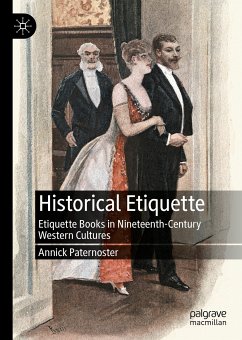This book is a groundbreaking study of etiquette in the nineteenth century when the success of etiquette books reached unprecedented heights in Britain, France, Italy, the Netherlands, and the United States. It positions etiquette as a fully-fledged theoretical concept within the fields of politeness studies and historical pragmatics. After tracing the origin of etiquette back to Spanish court protocol, the analysis takes a novel approach to key aspects of etiquette: its highly coercive and intricate scripts; the liminal rituals of social gatekeeping; the fear for blunders; the obsession with precedence. Interrogating the complex relationship between historical etiquette and adjacent notions of politeness, conduct, morality, convention, and ritual, the study prompts questions on gender stereotyping and class privilege surrounding the present-day etiquette revival. Through adopting a unique comparative approach and a corpus-based methodology this study seeks to revitalise our understandings of etiquette. This book will be of interest to scholars of historical linguistics and pragmatics, as well as those in neighbouring fields such as literary criticism, gender studies and family life, domestic and urban spaces.
Annick Paternoster is a Lecturer at the University of Lugano, Switzerland. She lectures Rhetoric and Stylistics at the Istituto di studi italiani, where she pursues an interdisciplinary research agenda based on historical pragmatics, the pragmatics of politeness and metapragmatics of Italian. Born in Belgium, she holds a PhD from the University of Antwerp.
Dieser Download kann aus rechtlichen Gründen nur mit Rechnungsadresse in A, B, BG, CY, CZ, D, DK, EW, E, FIN, F, GR, HR, H, IRL, I, LT, L, LR, M, NL, PL, P, R, S, SLO, SK ausgeliefert werden.









